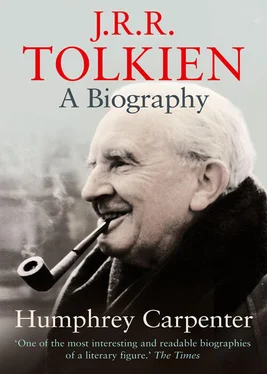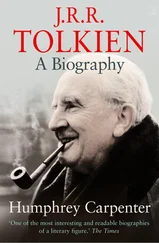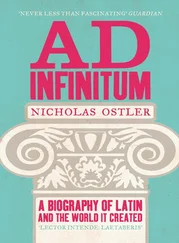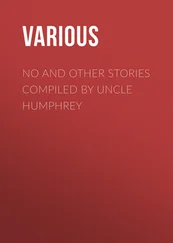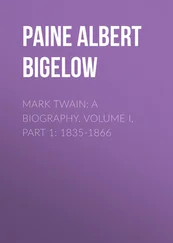
J.R.R. TOLKIEN
A BIOGRAPHY
HUMPHREY CARPENTER

Dedicated to the memory of ‘The T.C.B.S.’
Cover
Title Page J.R.R. TOLKIEN A BIOGRAPHY HUMPHREY CARPENTER
Part One Part One
A VISIT
PART TWO: 1892–1916: Early years
CHAPTER I: BLOEMFONTEIN
CHAPTER II: BIRMINGHAM
CHAPTER III: ‘PRIVATE LANG.’ – AND EDITH
CHAPTER IV: ‘T.C, B.S., ETC.’
CHAPTER V: OXFORD
CHAPTER VI: REUNION
CHAPTER VII: WAR
CHAPTER VIII: THE BREAKING OF THE FELLOWSHIP
PART THREE: 1917–1925: The making of a mythology
CHAPTER I: LOST TALES
CHAPTER II: OXFORD INTERLUDE
CHAPTER III: NORTHERN VENTURE
PART FOUR: 1925–1949(i):‘In a hole in the ground there lived a hobbit’
CHAPTER I: OXFORD LIFE
CHAPTER II: PHOTOGRAPHS OBSERVED
CHAPTER III: ‘HE HAD BEEN INSIDE LANGUAGE’
CHAPTER IV: JACK
Additional Images
CHAPTER V: NORTHMOOR ROAD
CHAPTER VI: THE STORYTELLER
PART FIVE : 1925–1949(ii): The Third Age
CHAPTER I : ENTER MR BAGGINS
CHAPTER II: ‘THE NEW HOBBIT’
PART SIX : 1949–1966: Success
CHAPTER I : SLAMMING THE GATES
CHAPTER II : A BIG RISK
CHAPTER III: CASH OR KUDOS
PART SEVEN: 1959–1973: Last years
CHAPTER I: HEADINGTON
CHAPTER II: BOURNEMOUTH
CHAPTER III: MERTON STREET
POSTSCRIPT: THE TREE
APPENDIX A
APPENDIX B
APPENDIX C
APPENDIX D
INDEX
About the Author
AUTHOR’S NOTE
ALSO BY HUMPHREY CARPENTER
Copyright
About the Publisher
Part One
It is mid-morning on a spring day in 1967. I have driven from the centre of Oxford, over Magdalen Bridge, along the London road, and up a hill into the respectable but dull suburb of Headington. Near a large private school for girls I turn left into Sandfield Road, a residential street of two-storey brick houses, each with its tidy front garden.
Number seventy-six is a long way down the road. The house is painted white and is partially screened by a tall fence, a hedge, and overhanging trees. I park the car, open the arched gate, go up the short path between rose bushes, and ring the front door bell.
For a long time there is silence, except for the rumble of distant traffic in the main road. I am beginning to think of ringing again or of turning away when the door is opened by Professor Tolkien.
He is slightly smaller than I expected. Tallness is a quality of which he makes much in his books, so it is a little surprising to see that he himself is slightly less than the average height – not much, but just enough to be noticeable. I introduce myself, and (since I made this appointment in advance and am expected) the quizzical and somewhat defensive look that first met me is replaced by a smile. A hand is offered and my own is firmly grasped.
Behind him I can see the entrance-hall, which is small and tidy and contains nothing that one would not expect in the house of a middle-class elderly couple. W. H. Auden, in an injudicious remark quoted in the newspapers, has called the house ‘hideous’, but that is nonsense. It is simply ordinary and suburban.
Mrs Tolkien appears for a moment, to greet me. She is smaller than her husband, a neat old lady with white hair bound close to her head, and dark eyebrows. Pleasantries are exchanged, and then the Professor comes out of the front door and takes me into his ‘office’ at the side of the house.
This proves to be the garage, long abandoned by any car – he explains that he has not had a car since the beginning of the Second World War – and, since his retirement, made habitable and given over to the housing of books and papers formerly kept in his college room. The shelves are crammed with dictionaries, works on etymology and philology, and editions of texts in many languages, predominant among which are Old and Middle English and Old Norse; but there is also a section devoted to translations of The Lord of the Rings into Polish, Dutch, Danish, Swedish, and Japanese; and the map of his invented ‘Middle-earth’ is pinned to the window-ledge. On the floor is a very old portmanteau full of letters, and on the desk are ink-bottles, nibs and pen-holders, and two typewriters. The room smells of books and tobacco smoke.
It is not very comfortable, and the Professor apologises for receiving me here, but he explains that there is no space in the study-bedroom in the house where he actually does his writing. He says that in any case this is all temporary: soon he will, he hopes manage to finish at least the major part of the work promised to his publishers, and then he and Mrs Tolkien will be able to move to more comfortable quarters and congenial surroundings, away from visitors and intrusions. He looks slightly embarrassed after the last remark.
I climb past the electric fire and, at his bidding, seat myself in a wheel-back chair, as he takes his pipe from the pocket of his tweed jacket and launches into an explanation of his inability to spare me more than a few minutes. A shiny blue alarm clock ticks noisily across the room as if to emphasise the point. He says that he has to clear up an apparent contradiction in a passage of The Lord of the Rings that has been pointed out in a letter from a reader; the matter requires his urgent consideration as a revised edition of the book is about to go to press. He explains it all in great detail, talking about his book not as a work of fiction but as a chronicle of actual events; he seems to see himself not as an author who has made a slight error that must now be corrected or explained away, but as a historian who must cast light on an obscurity in a historical document.
Disconcertingly, he seems to think that I know the book as well as he does. I have read it many times, but he is talking about details that mean little or nothing to me. I begin to fear that he will throw some penetrating question at me that will reveal my ignorance – and indeed now he does ask me a question, but fortunately it is rhetorical and clearly requires no more than the answer ‘yes’.
I am still nervous that there will be other and harder questions, doubly nervous because I cannot hear everything that he is saying. He has a strange voice, deep but without resonance, entirely English but with some quality in it that I cannot define, as if he had come from another age or civilisation. Yet for much of the time he does not speak clearly. Words come out in eager rushes. Whole phrases are elided or compressed in the haste of emphasis. Often his hand comes up and grasps his mouth, which makes it even harder to hear him. He speaks in complex sentences, scarcely hesitating – but then there comes a long pause in which I am surely expected to reply. Reply to what? If there was a question, I did not understand it. Suddenly he resumes (never having finished his sentence) and now he reaches an emphatic conclusion. As he does so, he jams his pipe between his teeth, speaks on through clenched jaws, and strikes a match just as the full stop is reached.
Again I struggle to think of an intelligent remark, and again he resumes before I can find one. Following some slender connecting thread, he begins to talk about a remark in a newspaper that has made him angry. Now I feel that I can contribute a little, and I say something that I hope sounds intelligent. He listens with courteous interest, and answers me at some length, turning my remark (which was really very trivial) to excellent use, and so making me feel that I have said something worth saying. Then he is off on some tangential topic, and I am once more out of my depth, able to contribute no more than a monosyllable of agreement here and there; though it does occur to me that I am perhaps valued just as much as a listener as a participant in the conversation.
Читать дальше
